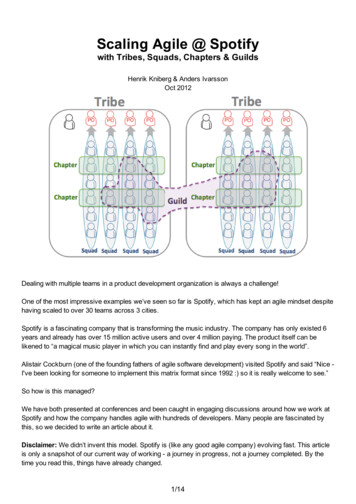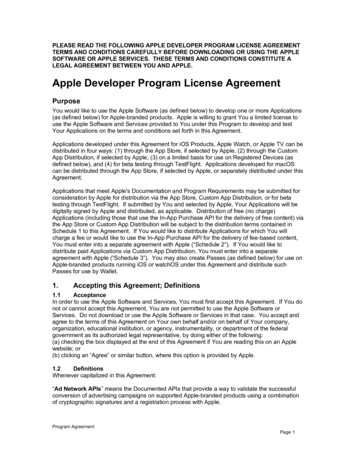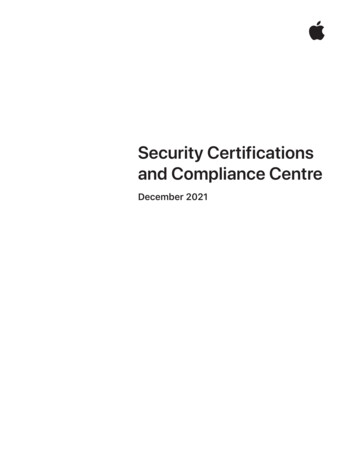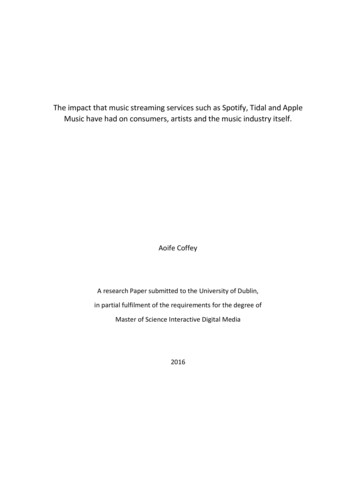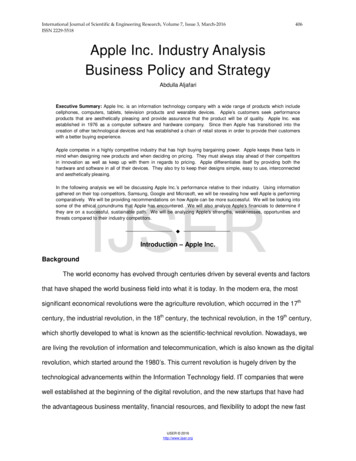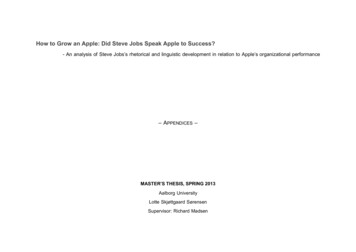
Transcription
Follow Now: Apple Podcasts / Spotify / Google Podcasts / RSS
Friday Fix: A Quick Trick for Becoming Less JudgmentalWelcome to The Verywell Mind Podcast. I’m Amy Morin, Editor-in-Chief of VerywellMind. I’m also a psychotherapist and a best-selling author of four books on mentalstrength.You’re listening to the Friday Fix. Every Friday, I share a quick mental strength strategythat can help fix the thoughts, feelings, and actions that can hold you back in life.And the fun part is, we record the show from a sailboat in the Florida Keys.Now, let’s dive in today’s episode!Today I’m talking about how to be less judgmental.And right about now, you might be thinking, “Why should I have to be less judgmental?If other people weren’t so terrible, I wouldn’t have to judge them so harshly.”Well, the idea that everyone else is bad is actually harmful for you. Believing that yourco-workers are lazy and that your friends are incompetent will increase your stresslevel. It will also cause you to be more judgmental of yourself. And no one feels betterwhen they’re judging themselves harshly.It’s not to say some people are judgy and some people aren’t. The truth is, we all judgesometimes.Learning how to recognize when you’re being judgmental is the first step. Then we canshift our thinking. This is a core component of many skills and mental health treatments,like dialectical behavior therapy (or DBT) and mindfulness.It’s an issue we often address in the therapy office.
Here’s an example:I once worked with a man who came in to see me because he needed help managinghis anger. He was a supervisor at a call center. He felt frustrated at work most of theand sometimes he yelled to get out his anger.He didn’t have anger problems in other areas of his life though. And he that he wasn’treally even bothered by the fact that he sometimes yelled at work. He said, “Theproblem isn’t that I yell sometimes. I guess the problem is that it doesn’t work. Andsome of those people I yell at go to HR and complain about me.”The more we talked about his frustrations with work, the clearer it became why he wasso frustrated–he was 100% convinced that all the people the company hired wereincompetent and ineffective. He said at times he felt like he was more of a babysitterthan a manager and he was angry that so many people seemed to carry around theirpersonal problems into work. Like this woman who once asked to go home earlybecause she was crying at her desk’ she’d just gone through a really tough breakup.She couldn’t concentrate on her job.The minute, though, that he walked into the office every morning, he said he could feelhis blood pressure rise. And then he started thinking about all the things people aroundhim were likely to do to mess things up throughout the whole day.And he said as the day went on, the employees didn’t disappoint. And his belief that allthe employees were ineffective and incompetent strengthened.So, our work in therapy really centered around becoming less judgmental of the peoplehe worked with.At first, he was cynical of that approach, though, and he didn’t hold back that he hadsome judgments about me for even suggesting it. But he eventually agreed to give it ashot.He started reminding himself that the employees in the office were human beings who,much like him, would make mistakes sometimes. And he started looking at theirmistakes as opportunities for him to help them learn in a supportive environment.Rather than yell at them, he could teach them how to do better in the future.Obviously, his stress didn’t completely go away in an instant. But within a few weeks, henoticed he actually started to feel a little bit better.
By looking at the people he worked with as human beings who were likely doing theirbest, he could treat them with compassion, rather than anger— something he’d neveractually tried before.This idea that you can benefit from being less judgmental is related to what we talkedabout in last week’s episode–that it’s helpful to you to assume the best in others.That’s hard to do, though. We’re really quick to judge others for being a jerk or for beinglazy. But often, there’s a story behind someone’s behavior and our first conclusionsmight not be accurate.Imagine you’re at a park. You see a cute little kid playing all by themselves in asandbox. The child is laughing and smiling and you think, “What a cute kid.” Then, yousee an adult whom you assume is the mom walk over and say something to him. Thechild immediately jumps up and kicks her in the shins. So now you’re thinking, ‘Thatkid’s a brat!’ Then, the woman you assumed was the mom walks back in your directionand sits on a bench next to you. She explains that the child is her foster child. Hisparents died in a car accident and he’s angry that he can’t go home. He’s confusedabout why he’s living with her–someone who, until recently, was a complete stranger.Suddenly, you might feel incredible compassion for that child who just kicked thiswoman in the shins.This is an example of how our judgments can quickly shift as we gain more informationabout what’s going on. Yet, we often treat our judgments as if they’re facts.You might say, “My neighbor is mean,” or “My sister is a hot mess who will never gether life together.” That doesn’t mean that those statements are true. That’s just yourexperience with those people as you look at them through your own lens of life.You can benefit from shifting to factual statements. It may be more accurate to say, “Myneighbor yelled at me last week for not cutting my grass after he cut his and my lawnlooks bad” or “My sister is having some financial difficulties right now.”We can shift our judgments about our experiences too–not just about people.Take ownership for your feelings about something rather than deciding something is afact.For example, if you find yourself thinking, “Ugh, that movie was terrible,” replace it with,“I didn’t like that movie.”Instead of saying, “That party was boring,” try saying, “I didn’t connect with the peoplethere.”
And rather than say, “That chicken tasted awful,” say, “It was too spicy for my taste.”That subtle shift in your language can empower you to take ownership of how you think,feel, and behave.Give it a try this week. Catch yourself making judgmental statements and reframe them.Take responsibility for how you feel without labeling other people or experiences asbeing a certain way. Then, see if it shifts how you feel.Don’t forget not to be judgmental of yourself for making judgments. It’s human nature toput people or experiences in categories, like good or bad. Your brain is taking in somuch information all day that it’s looking for shortcuts by categorizing things quickly. So,your brain will default to doing this naturally. It takes work to retrain your brain andremind yourself that sweeping judgments can drain you of the mental strength you needto be your best.If you know someone who could benefit from hearing this message, share it with them.Simply sharing a link to this episode could help someone feel better and grow stronger.And if you like the show, make sure to subscribe to us on your favorite platform.Do you want free access to my online mental strength course? It’s called “10 MentalStrength Exercises That Will Help You Reach Your Greatest Potential.” To get your freepass, just leave us a review on Apple Podcasts. Take a screenshot of your review andemail it to us. Our address is podcast@verywell.com. We’ll reply with your all-accesspass to the course.Thank you for hanging out with me today and for listening to The Verywell MindPodcast!And as always, a big thank you to my show’s producer (who went to the Festival in KeyWest with me over the weekend), Nick Valentin.
Thank you for hanging out with me today and for listening to The Verywell Mind Podcast! And as always, a big thank you to my show’s producer (who went to the Festival in Key West w
